How Ambulatory Detox Helps Patients Maintain Daily Responsibilities

Balancing Recovery and Daily Life
In the journey to overcoming substance dependence, maintaining daily responsibilities is often a major concern. Ambulatory detox, also known as outpatient detox, has emerged as a preferred approach for many individuals seeking to manage withdrawal safely while continuing with their personal, professional, and social commitments. This article explores how ambulatory detox functions, its benefits, and why it is becoming an integral part of modern addiction recovery.
Understanding What Ambulatory Detox Is
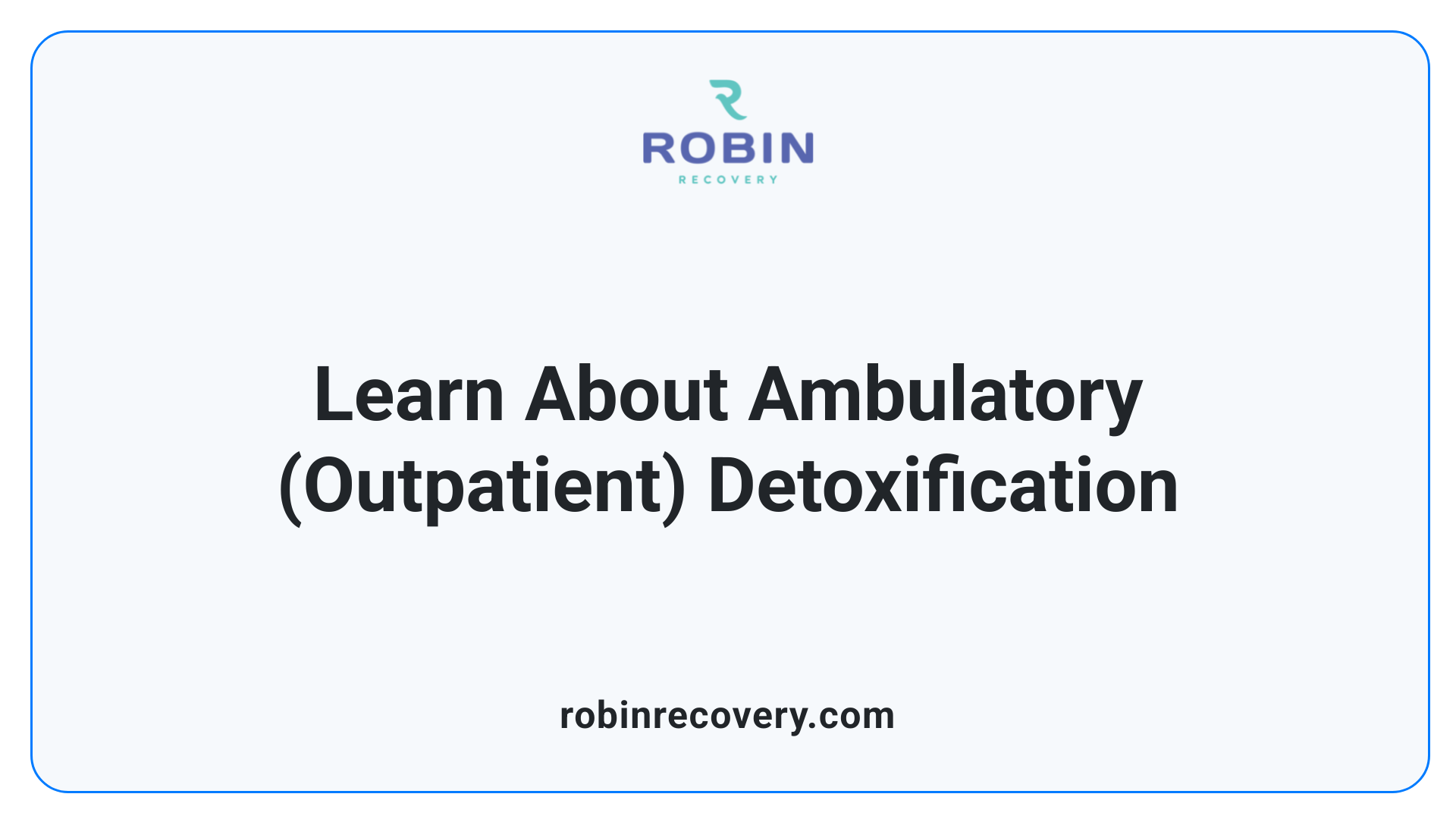
What is ambulatory detox?
Ambulatory detox, also called outpatient detox, is a treatment method designed for people with mild to moderate substance use disorders. Unlike inpatient detox, where individuals stay in a hospital or specialized facility, ambulatory detox allows patients to remain at home during their recovery process. The treatment involves regular visits to a healthcare center for medical check-ups, medication management, and therapy sessions.
During these visits, healthcare professionals closely monitor withdrawal symptoms and adjust medications like benzodiazepines for alcohol or medications such as buprenorphine/naloxone for opioids. Psychological support, including counseling and behavioral therapies like CBT or DBT, complements medical treatment.
This approach is especially suitable for those who are motivated to recover, have a supportive home environment, and experience less severe withdrawal symptoms. It offers a flexible and personalized way to detox that accommodates daily responsibilities such as work or family commitments.
The medical supervision involved
Ambulatory detox ensures safety through structured medical oversight. Regular visits include assessments by addiction medicine specialists who evaluate withdrawal progress using standardized scales like CIWA-Ar for alcohol and COWS for opioids. Continuous monitoring helps in timely medication adjustments, addressing any complications.
Healthcare professionals are dedicated to providing support throughout the process, managing symptoms, preventing medical emergencies, and determining whether a patient can safely continue outpatient detox or needs to transition to inpatient care.
Comparison with inpatient detox
Inpatient detox involves residents staying in a facility with 24/7 medical supervision, making it suitable for severe or complicated cases with risks like seizures or delirium tremens. Conversely, outpatient (ambulatory) detox is less restrictive and more convenient for individuals with milder symptoms.
While inpatient detox offers intense medical support, ambulatory detox stands out for its flexibility, lower costs, and ability to let patients maintain their daily routines. Success rates between both settings are comparable, provided patients are carefully assessed to match the level of care to their needs.
Suitability for mild to moderate addiction cases
Ambulatory detox is ideal for those experiencing milder withdrawal symptoms, with stable physical and mental health. Patients should have a reliable support system and a stable home environment.
It is not suitable for individuals with severe withdrawal issues, co-occurring psychiatric conditions, or high risk factors such as a history of delirium tremens. Proper evaluation by healthcare professionals is essential to determine if outpatient detox is the right option.
Aspect Inpatient Detox Outpatient (Ambulatory) Detox Details Setting Residential hospital or detox facility Living at home Continued daily routines possible Supervision 24/7 medical care Scheduled visits, regular monitoring Safety depends on symptom severity Suitability Severe withdrawal, high-risk cases Mild to moderate symptoms Based on health and support system Cost Usually higher Cost-effective Varies with insurance options Flexibility Limited High Maintains personal responsibilities Success Rate Comparable Comparable Depends on individual assessment
Ambulatory detox provides an effective bridge toward continued recovery efforts, enabling individuals to initiate sobriety safely while keeping their daily lives intact.
Benefits of Outpatient Detox in Daily Life
What are the benefits of outpatient detox?
Outpatient detox provides a range of advantages that make it an attractive option for many individuals seeking to overcome substance dependence. One of its primary benefits is cost-effectiveness. Outpatient programs are generally less expensive than inpatient facilities because they do not require hospitalization or around-the-clock medical supervision, reducing financial barriers to treatment.
Support system maintenance is another significant advantage. Patients can stay connected with family, friends, and support groups, which are crucial for emotional stability and ongoing recovery. Being in a familiar environment often boosts motivation and confidence while decreasing feelings of isolation.
Moreover, outpatient detox dramatically reduces hospital stays and associated costs. Patients manage withdrawal symptoms through scheduled visits and medication support, avoiding the high expenses and time commitments of inpatient care. This flexibility also allows individuals to continue their daily responsibilities, such as work or school, without significant disruption.
In terms of privacy, outpatient detox offers enhanced confidentiality. Patients can undergo detoxification away from public view, maintaining personal privacy and reducing stigma associated with addiction treatment.
Finally, being in a familiar environment can support emotional well-being. Patients feel more at ease and less anxious when they are in their own homes, which can improve their overall mental health during withdrawal.
In summary, outpatient detox combines medical support with the comfort and familiarity of home life. It affirms that recovery does not necessarily require complete separation from one's daily routine, making it a practical, supportive, and accessible pathway to sobriety.
For more detailed insights, search for "Advantages of outpatient detox programs," which highlights its benefits further and discusses patient success stories.
How Outpatient Detox Facilitates Maintenance of Responsibilities
How does outpatient detox help patients maintain their daily responsibilities during treatment?
Outpatient detox provides a flexible framework that allows individuals to continue living at home while managing withdrawal symptoms safely. With scheduled visits for medical check-ins, medication administration, and counseling, patients can integrate their treatment into daily routines without significant disruption.
This setup enables people to keep their jobs, care for family members, and engage in social or community activities. Healthcare professionals closely monitor patients, adjusting medications and providing support as needed to ensure safety throughout the detox process.
The familiarity of home surroundings offers psychological comfort, reducing stress and promoting emotional steadiness. Patients can stick to their usual routines, which reinforces a sense of normalcy and control during a challenging time.
Maintaining personal responsibilities while undergoing detox can improve motivation and commitment. It fosters a positive environment for recovery, helping individuals feel connected and supported rather than isolated.
Overall, outpatient detox’s adaptable approach makes it easier for patients to stay engaged with their everyday life, increasing the likelihood of successful detoxification and subsequent treatment adherence.
Goals and Components of Detoxification Process
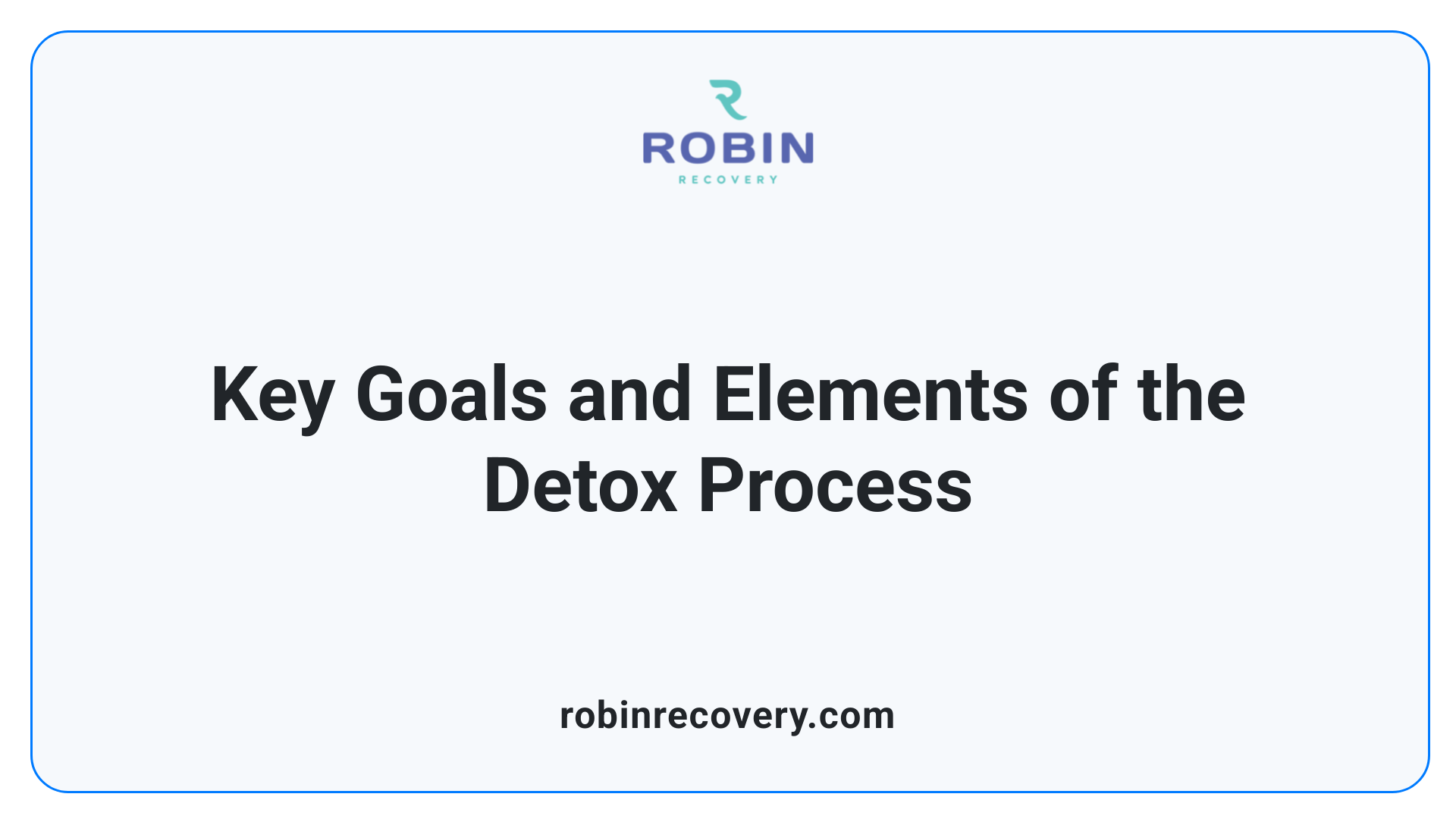
What is the primary goal of detoxification?
The main objective of detoxification is to ensure the safety and stability of individuals experiencing substance dependence. It involves carefully managing withdrawal symptoms through medical supervision, which reduces the risk of severe health complications such as seizures or delirium tremens.
Detoxification focuses on stabilizing the patient both physically and psychologically, allowing the body to rid itself of toxins associated with drug and alcohol use. Healthcare professionals assess the individual's health status and customize treatment plans tailored to their specific needs.
Besides immediate safety, detox sets the stage for ongoing recovery efforts. It helps move individuals towards a toxin-free state and addresses urgent health risks, making them more receptive to subsequent treatments like counseling or support groups.
Evaluation and personalized treatment planning
Initial evaluation is a critical part of the detox process. Healthcare providers perform comprehensive assessments, including physical exams and the use of symptom scales such as CIWA-Ar for alcohol withdrawal and COWS for opioid withdrawal.
This evaluation helps determine the severity of dependence, the specific substances involved, and any co-occurring mental or medical conditions. Based on this, a personalized treatment plan is developed, which includes specific medications, visit schedules, and psychological support tailored to the individual's needs.
Assessment also extends to reviewing the patient's social environment and support system, vital factors in outpatient detoxity settings. This ensures safety and increases the chances of successful treatment.
Medications used for withdrawal management
Medications are central to managing withdrawal symptoms effectively. In alcohol detox, benzodiazepines like diazepam and chlordiazepoxide are preferred to prevent seizures and reduce anxiety.
For opioid withdrawal, medications such as methadone and buprenorphine/naloxone are primarily used to taper symptoms and cravings safely. Alternatives like clonidine, lofexidine, and guanfacine help manage symptoms like sweating, hypertension, and agitation.
Specific dosages and protocols are tailored, including symptom-triggered therapy or gradual tapering, based on the individual's condition. These medications not only ease withdrawal but also help prevent complications during the process.
Supportive therapies and psychological counseling
Psychological support plays a crucial role in detoxification. Counseling, both individual and group, helps address emotional and mental challenges associated with withdrawal.
Supportive therapies include education on addiction, relapse prevention strategies, and coping skills development. Integrated approaches such as Cognitive Behavioral Therapy (CBT) help modify thought patterns related to substance use.
Support from family and peer networks enhances recovery, creating a supportive environment essential for long-term sobriety. Ongoing mental health support, including psychiatric evaluation and medication, may be necessary if co-occurring conditions like depression or anxiety are present.
Overview of Detox Components
Component Description Details/Notes Medical Evaluation Initial assessment to determine health status and suitability for detox Symptoms scales like CIWA-Ar, COWS used Personalized Treatment Plan Customized medications, schedule, and support options based on assessment Tailored to substance type and severity Withdrawal Medications Drugs like benzodiazepines and opioids to manage symptoms Specific protocols for each substance Psychological and Supportive Care Counseling, family involvement, and mental health support Aims to sustain long-term recovery Monitoring and Transition Support Regular check-ins and planning for continued care post-detox Ensures safety and continuity of treatment
This comprehensive approach to detoxification ensures not only the safe and effective removal of toxins but also lays a strong foundation for ongoing recovery and long-term sobriety.
Role of Medications in Outpatient Detox
What are the essential components of detoxification?
The core elements of detoxification include a thorough medical assessment, tailored medication management to ease withdrawal symptoms, ongoing supervision, and psychological support. Proper evaluation helps determine the severity of dependence, co-occurring mental health issues, and the individual's overall health.
Medications are chosen based on the specific substance involved. For alcohol withdrawal, benzodiazepines such as chlordiazepoxide and diazepam are commonly employed to prevent seizures and reduce anxiety.
In opioid detox, medicines like methadone and buprenorphine/naloxone are primarily used. These help decrease cravings and alleviate withdrawal discomfort.
The process also involves continuous monitoring for medication effectiveness and side effects, adjusting doses as needed. Counseling and education further support the patient's understanding and motivation to continue recovery.
Altogether, these components create a comprehensive, safe, and patient-focused detox experience, setting the stage for ongoing treatment and long-term sobriety.
Safety Considerations and Patient Selection
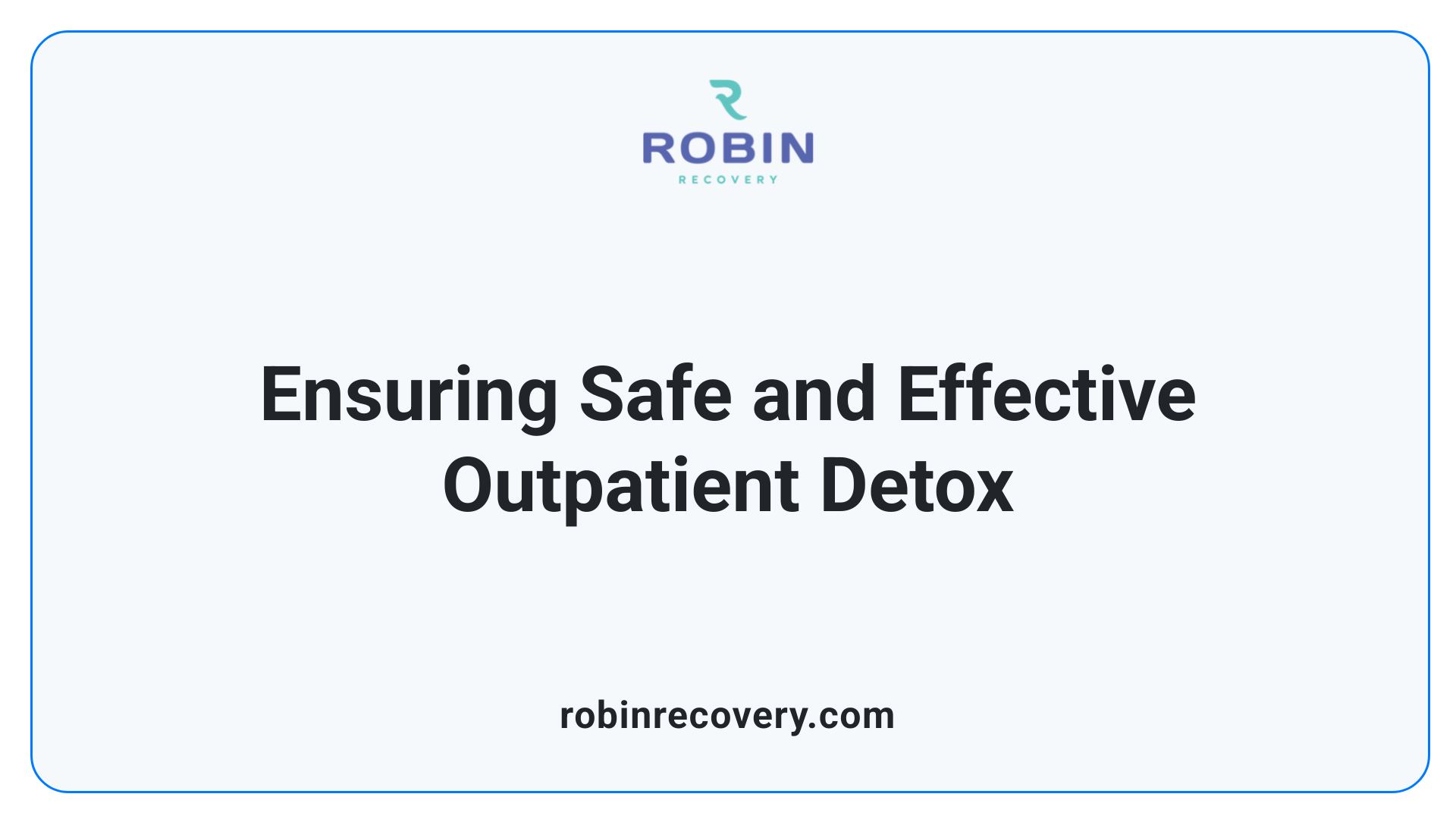
Criteria for outpatient detox suitability
Ambulatory detoxification is a beneficial option for individuals with mild to moderate withdrawal symptoms who have a stable physical and mental health status. To ensure safety, patients should have a manageable addiction level, a strong support system at home, and no history of severe relapse or complex medical issues.
In addition, a reliable home environment free from access to substances is critical. The patient's ability to comply with medical instructions and attend follow-up visits also influences eligibility. Healthcare providers conduct comprehensive evaluations to assess the individual's dependence severity, mental health, and social circumstances, tailoring the detox approach accordingly.
Are there risks associated with outpatient detox?
Yes, outpatient detox carries certain risks that require careful consideration. One significant concern is the potential for relapse, especially because outpatient settings allow ease of access to substances, which may undermine recovery efforts.
Moreover, outpatient detox is not suitable for all cases. Patients experiencing severe withdrawal symptoms, such as seizures, hallucinations, or delirium tremens in alcohol withdrawal, need inpatient care where 24/7 medical supervision is available. Similarly, those with complex medical conditions or high psychiatric risks should undergo inpatient detox to prevent complications.
Proper patient selection is essential for safety. Medical professionals evaluate whether the individual has a supportive home environment, is motivated for recovery, and can follow medical protocols. Those meeting these criteria are considered suitable candidates for outpatient detox, maximizing safety and increasing the chances of successful detoxification.
This careful screening process helps reduce risks and ensures that outpatient detox serves as an effective, safe entry point into ongoing addiction treatment programs.
Post-Detox Transition and Continued Care
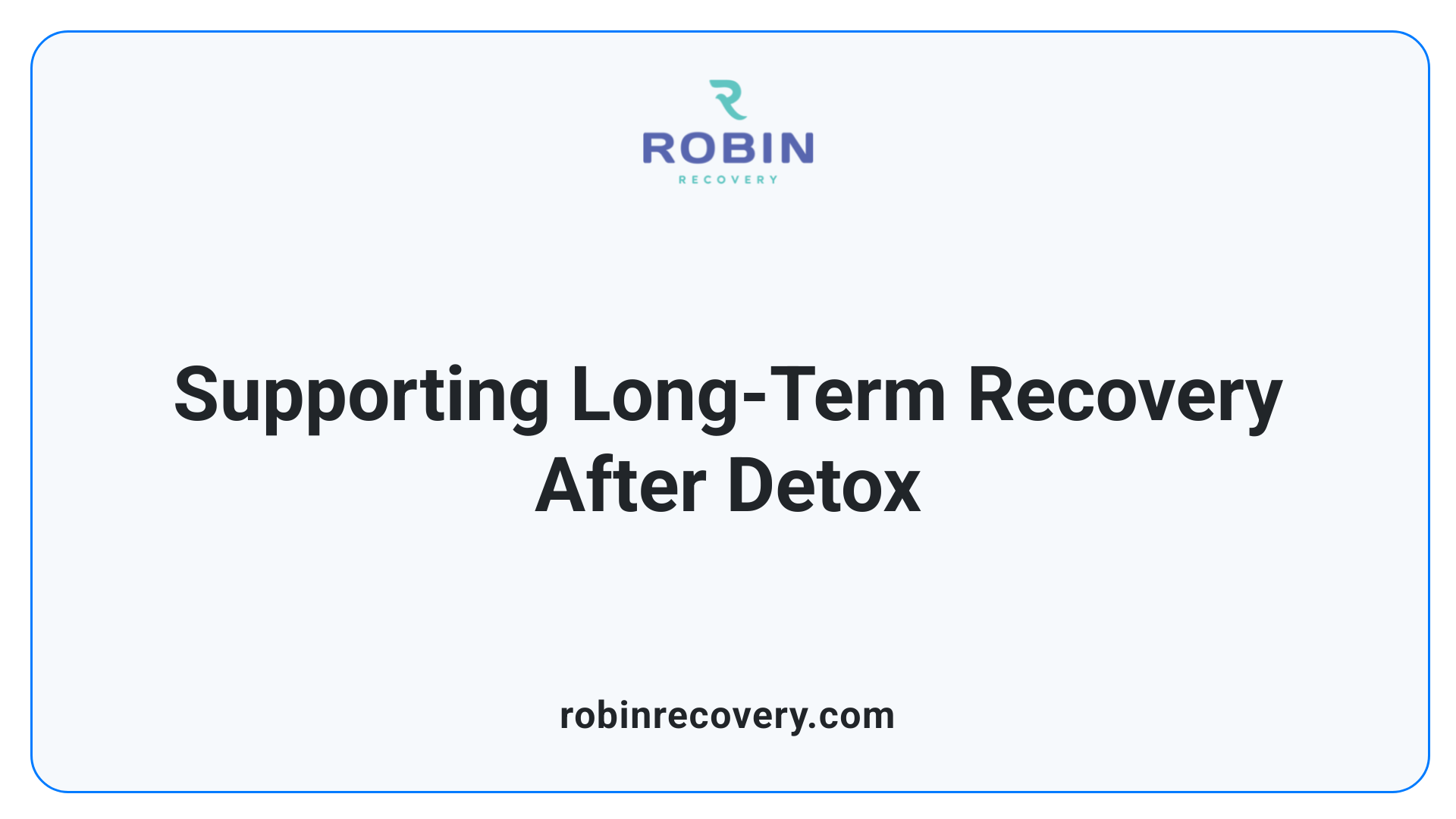
What aftercare is recommended following detox?
Following detoxification, ongoing support plays a vital role in maintaining sobriety and preventing relapse. Medical professionals generally recommend a combination of outpatient therapy, support groups, and medication-assisted treatment (MAT), customized to meet each person's unique needs.
Outpatient therapy provides a space to explore emotional, psychological, and behavioral challenges that may have contributed to substance dependence. Support groups like Alcoholics Anonymous or Narcotics Anonymous offer peer encouragement and accountability.
Medication-assisted treatment involves medications such as methadone, buprenorphine, or naltrexone, which help reduce cravings and manage underlying addiction conditions. Regular follow-up appointments with healthcare providers are crucial for tracking progress, making therapy adjustments, and addressing any emerging issues.
Engaging in structured aftercare not only consolidates the progress achieved during detox but also helps build new coping skills. It prepares individuals for a sustainable, substance-free future by reinforcing healthy routines and resilience.
In essence, consistent post-detox care creates a foundation for long-term recovery, supporting individuals in navigating challenges and reducing the risk of relapse.
Overall Impact and Success Rates of Outpatient Programs
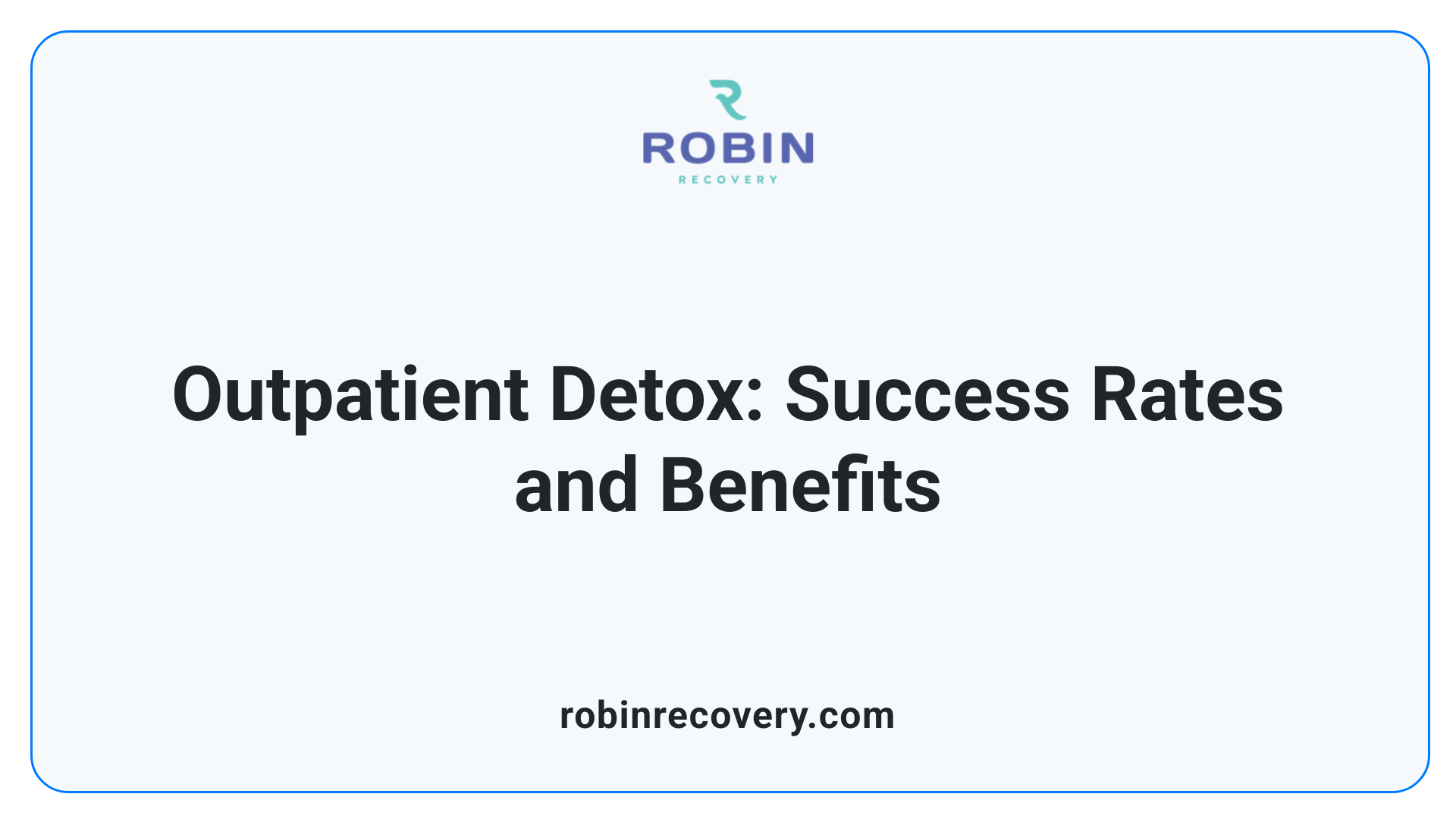
How do success rates compare between outpatient and inpatient detox?
Research shows that overall, there is no significant difference in success rates between outpatient and inpatient detox programs. Studies indicate that success is largely influenced by individual factors such as motivation, available social support, and ongoing engagement in therapy rather than the setting itself.
What factors influence treatment outcomes?
Factors that play into the effectiveness of detox include the patient’s level of dependence, their mental health status, the strength of their support system, and their commitment to continued treatment post-detox. Patients with mild to moderate withdrawal symptoms who have stable home environments tend to fare well with outpatient programs.
What does evidence say about outpatient detox effectiveness?
Evidence supports outpatient detox as a safe and effective option for suitable candidates. When patients are appropriately assessed and selected, outpatient programs offer personalized treatment that can match the success rates of inpatient care. The flexibility of outpatient detox allows individuals to manage their responsibilities while undergoing withdrawal, which can enhance motivation and morale.
How do patient satisfaction and long-term sobriety compare?
Patient satisfaction levels are generally high with outpatient programs, especially due to the comfort and familiarity of remaining at home. Long-term sobriety data also show comparable outcomes to inpatient care, particularly when outpatient detox is combined with ongoing treatment modalities like therapy, medication-assisted treatment (MAT), and support groups.
Aspect Inpatient Detox Outpatient Detox Notes Success Rates Similar; around 70-80% initially Similar; around 70-80% initially Both depend on ongoing support and motivation Patient Satisfaction High, but varies with comfort Generally high due to flexibility Comfort and convenience improve satisfaction Long-term Sobriety Comparable, depending on follow-up Comparable, depending on follow-up Effectiveness tied to continued care post-detox Suitability Severe dependence, complex cases Mild to moderate dependence, stable home environment Selection is crucial for success
In summary, outpatient detox programs offer a compelling alternative to inpatient care, with success rates comparable when properly tailored to the patient's needs. The choice should be guided by individual health status and support systems, under professional supervision.
Empowering Recovery Through Flexibility and Support
Ambulatory detox programs play a vital role in modern addiction treatment by offering a safe, flexible, and effective pathway for individuals to manage withdrawal while maintaining their daily lives. By combining medical oversight, personalized care, and support systems, outpatient detox empowers patients to continue working, caring for loved ones, and engaging in important activities during recovery. As the field evolves, these programs will likely become increasingly integral to achieving sustainable sobriety, emphasizing that recovery can coexist with everyday responsibilities.
References
- Ambulatory Detox vs. Inpatient Detox: Which One Is Right for You?
- Benefits of Ambulatory Detox: Recovery with Convenience and Safety
- Everything You Need to Know About Ambulatory Detox
- Ambulatory detoxification in alcohol use disorder and opioid use ...
- Exploring Outpatient Detox: What You Need to Know
- Ambulatory Medically Supervised Withdrawal Services (AMSWS)
- What Happens During Alcohol & Substance Abuse Detox?
